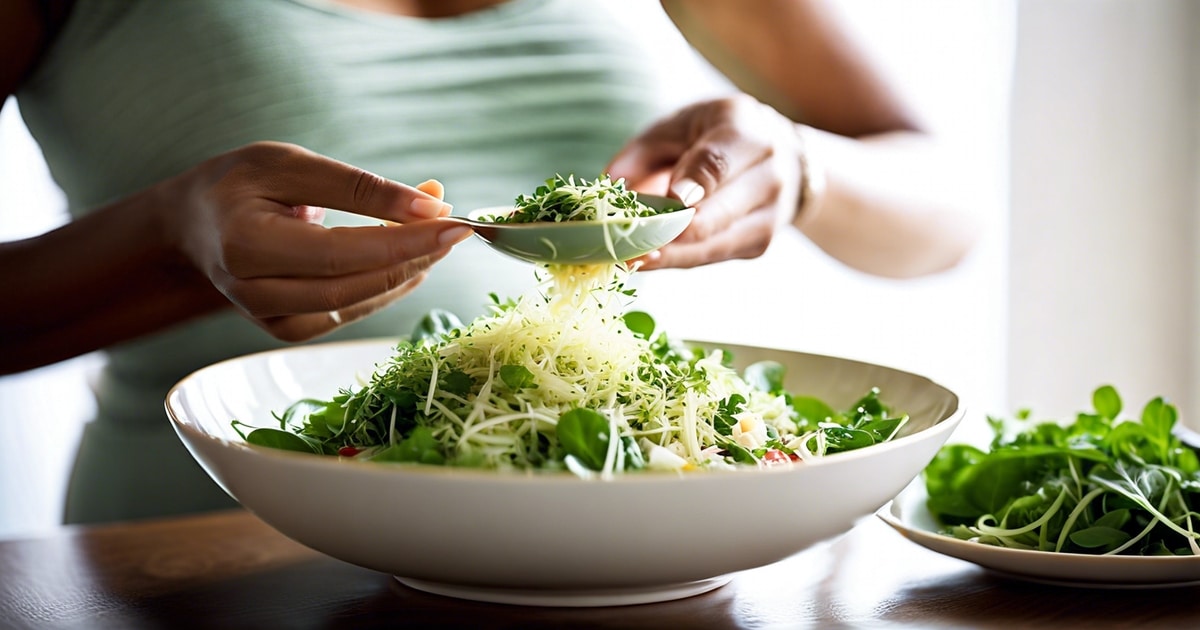Key Takeaways
-
Pregnant women should avoid consuming raw alfalfa sprouts due to the risk of bacterial contamination and opt for cooked or thoroughly washed sprouts instead.
-
Incorporating cooked or washed sprouts in a maternal diet can provide essential nutrients like folate, fiber, and vitamins, promoting a healthy pregnancy.
-
Pregnant women can explore safe alternatives such as cooked or pasteurized sprouts to satisfy their taste while minimizing risks when managing cravings for alfalfa sprouts.
-
Selecting fresh and high-quality sprouts, washing them thoroughly, and storing them properly are key tips for ensuring the safety of consuming sprouts during pregnancy.
-
Expectant mothers must be aware of potential side effects and precautions associated with alfalfa consumption, especially if they have specific health conditions.
-
Exploring healthy sprouted recipes that involve cooking or pasteurizing the sprouts can offer safe and nutritious options for pregnant women.
Are you expecting and wondering about including alfalfa sprouts in your diet? Many pregnant women seek nutritious options, and alfalfa sprouts often appear. This post delves into the safety of consuming alfalfa sprouts during pregnancy, their potential benefits, and any associated risks. It’s essential to make informed choices for a healthy pregnancy journey.
Evaluating the Safety of Alfalfa Sprouts During Pregnancy

Potential Contamination Issues
Raw alfalfa sprouts have been associated with foodborne illness due to bacterial contamination. Bacteria like Salmonella, E. coli, and Listeria can thrive in sprouting seeds in warm and moist conditions. When consumed by pregnant women, these bacteria pose a significant risk of infection, potentially leading to severe complications for both the mother and the developing fetus.
Pregnant women are more susceptible to foodborne illnesses due to changes in their immune system during pregnancy. This heightened vulnerability makes it crucial for expectant mothers to avoid consuming raw alfalfa sprouts as a precautionary measure against potential contamination issues that could jeopardize their health and that of their unborn child.
Importance of Assessing Safety
It’s essential for pregnant women to carefully evaluate the safety of including alfalfa sprouts in their diet. While alfalfa sprouts are nutrient-dense and offer various health benefits, such as lowering cholesterol levels and blood pressure, according to some studies conducted on animals, the potential risks associated with bacterial contamination should not be overlooked.
Pregnancy is critical when dietary choices are vital in ensuring maternal and fetal well-being. Therefore, assessing the safety aspects before incorporating new food into one’s pregnancy diet is imperative for safeguarding against potential harm.
Understanding the Risks of Raw Sprouts for Expectant Mothers
Specific Risks
Raw alfalfa sprouts can carry harmful bacteria such as listeria and salmonella, posing a higher risk of foodborne illness for pregnant women. These bacteria thrive in the warm, moist conditions required for sprouting, making raw sprouts a potential source of food poisoning.
Consuming contaminated alfalfa sprouts during pregnancy can lead to severe health complications due to a weakened immune system and hormonal changes. The impact of bacterial contamination on expectant mothers is particularly concerning because it can result in more severe symptoms and longer recovery times.
Precautions to Consider
Pregnant women should avoid raw alfalfa sprouts altogether or ensure they are thoroughly cooked before consumption. This precautionary measure significantly reduces the chances of exposure to harmful bacteria while still allowing them to benefit from the nutritional value of sprouts.
Expectant mothers must consult their healthcare providers about consuming raw alfalfa sprouts during pregnancy. Doctors can provide personalized guidance based on individual health histories and experiences, offering valuable insights into whether including raw sprouts in their diet poses any risks.
Nutritional Benefits of Sprouts in a Maternal Diet
Essential Nutrients
Alfalfa sprouts are packed with essential nutrients that benefit expectant mothers. These tiny greens contain many vitamins and minerals, including vitamins K, C, folate, and manganese. These nutrients are crucial in supporting the mother’s and growing baby’s overall health and development during pregnancy.
Adding alfalfa sprouts to a pregnant woman’s diet can help meet the extra nutritional needs during pregnancy. Alfalfa sprouts have lots of folate, which helps prevent birth defects. They also have a lot of vitamin C, which helps the body absorb iron and prevents anemia, which is common in pregnancy.
Balanced Maternal Diet
Eating sprouts like alfalfa sprouts during pregnancy gives moms important nutrients for their health and the baby’s growth. Moms can have a healthy diet by eating sprouts with other good foods like fruits, veggies, lean meats, and whole grains. This helps them get the right nutrients during pregnancy.
-
Alfalfa sprouts provide essential vitamins like vitamin K and vitamin C.
-
Folate found in alfalfa supports neural tube development.
-
Vitamin C enhances iron absorption to prevent anemia during pregnancy.
Alternatives to Raw Alfalfa Sprouts for Pregnant Women

Cooked Sprouts
Cooking alfalfa sprouts thoroughly can eliminate the risk of harmful bacteria, making them safe for consumption. Boil or steam the sprouts until they are thoroughly cooked.
Consuming cooked alfalfa sprouts ensures that any potential bacteria in raw sprouts are destroyed, reducing the risk of foodborne illnesses.
Other Nutritious Options
Pregnant women can choose various other nutritious options to fulfill their cravings for sprouts. Examples include broccoli, radish, and mung bean sprouts.
These alternatives provide similar nutritional benefits to alfalfa sprouts while minimizing the risks of consuming raw alfalfa during pregnancy.
Diverse Selection of Healthy Alternatives
In addition to cooked or alternative types of sprouts, expectant mothers have a diverse selection of healthy alternatives. These may include leafy greens like spinach and kale, which offer essential nutrients like folate and iron.
Furthermore, incorporating vegetables like cucumbers and bell peppers into meals can add crunchiness and freshness similar to what one might enjoy from alfalfa sprout consumption.
Managing Cravings for Alfalfa Sprouts Safely
Balancing Cravings and Health
Pregnancy often brings about cravings for specific foods, including alfalfa sprouts. However, it’s crucial to balance these cravings with the need for a healthy diet during this time. While raw alfalfa sprouts may pose a risk due to potential contamination, there are mindful approaches that pregnant women can adopt to manage their cravings safely.
Pregnant women can enjoy the taste of alfalfa sprouts by cooking them instead of eating them raw. Steaming or sautéing the sprouts can reduce the risk of getting sick from bacteria. This way, moms-to-be can satisfy their cravings without worrying about their or the baby’s health.
Another essential aspect is how certain foods affect blood sugar levels during pregnancy. It’s important to maintain stable blood sugar levels while managing food preferences. For instance, if an individual has gestational diabetes, they should be cautious about consuming foods that could cause spikes in blood sugar levels.
Mindful Approaches
When managing cravings for alfalfa sprouts during pregnancy, it’s vital to prioritize nutrient-rich alternatives that offer similar benefits. Foods high in iron, such as spinach and lentils, can help address iron deficiency without posing potential health risks associated with raw sprouts.
Key Tips for Selecting and Consuming Safe Sprouts
Choosing Safe Sprout Products
When selecting raw sprouts during pregnancy, it’s crucial to prioritize food safety. Look for products with a recent sell-by date to ensure freshness. Opt for sprouts from reputable sources or local farmers’ markets known for their commitment to safe growing practices.
Inspecting the packaging for any signs of spoilage or damage is also essential. Avoid purchasing sprouts if the container appears swollen, which could indicate bacterial contamination. By following these guidelines, pregnant women can minimize the risk of consuming unsafe sprout products.
Proper Handling and Storage Practices
To maintain sprout safety, handling and storing them correctly at home is important. Upon bringing raw alfalfa sprouts home, promptly refrigerate them at 40°F (4°C) or below to impede bacterial growth. Ensure that they are stored in a clean container, separate from other foods, especially raw meat and poultry.
Always adhere to proper handwashing procedures before handling sprouts. Thoroughly wash hands with soap and water before and after touching raw sprouts. By implementing these practices, expectant mothers can uphold optimal food safety standards when managing alfalfa sprouts at home.
Side Effects and Precautions for Alfalfa Consumption
Potential Side Effects of Consuming Alfalfa Sprouts During Pregnancy
Consuming alfalfa sprouts during pregnancy can pose potential risks due to the risk of bacterial contamination. This can lead to foodborne illnesses, adversely affecting the mother and the developing baby. The presence of harmful bacteria such as E. coli or Salmonella in alfalfa sprouts is a concern, especially for pregnant women, as it can result in severe health complications.
Pregnant women should be careful about eating alfalfa sprouts because they might have germs that can make them sick. It’s important to know that raw or not fully cooked sprouts, like alfalfa sprouts, are more likely to have bad bacteria than cooked vegetables like broccoli. So pregnant women need to be careful when eating alfalfa sprouts.
Precautions to Minimize Potential Risks Associated with Alfalfa Consumption
To be safe when eating alfalfa sprouts while pregnant, wash them well and cook them before eating. Washing removes any bacteria on the surface, and cooking kills any harmful bacteria.
It is advisable for many women who are pregnant or breastfeeding to opt for safer alternatives like cooked broccoli instead of raw alfalfa sprouts due to safety concerns related to microbial contamination.
Healthy Sprouted Recipes for Expectant Mothers
Pregnancy Diet
Pregnant women need a well-balanced pregnancy diet to support their health and the growth of their babies. Including alfalfa sprouts in meals can be beneficial, as they are rich in essential nutrients like folate, fiber, and vitamins A, C, E, and K. These nutrients are crucial for developing the baby’s neural tube and overall health.
You can put alfalfa sprouts in salads, wraps, sandwiches, or smoothies. But if you’re pregnant, ensure the sprouts are cooked or pasteurized to stay safe from foodborne illness. For example, add cooked broccoli with alfalfa sprouts to a stir-fry for extra nutrients and safety.
Including broccoli and alfalfa sprouts in a quiche or omelet enhances the flavor and offers additional nutritional benefits. This ensures that expectant mothers enjoy delicious meals while prioritizing taste and safety.
Baby
Pregnant women should eat healthy food like alfalfa sprouts to help their babies grow strong. They can cook the sprouts in different dishes to stay safe and get all the good stuff they need.
Safety Precautions for Specific Conditions and Alfalfa Use
Pregnancy Considerations
Pregnant women should be careful about eating alfalfa sprouts because they can have bacteria, especially in humid places. Pregnant women need to be safe based on their health. Some health problems can make it easier to get sick from food, so pregnant women with these issues should talk to a doctor before eating alfalfa sprouts.
Pregnant women who want to eat alfalfa sprouts should be careful, especially if they have health problems like diabetes. These health issues can make them more likely to get sick from food, so they should talk to their doctors before eating alfalfa sprouts while pregnant.
Consulting Healthcare Professionals
It’s important for pregnant women with specific health conditions or diseases to follow general guidelines and consult their healthcare professionals before incorporating alfalfa sprouts into their diets. By doing so, they can ensure that they take necessary precautions and make informed decisions about their dietary choices during pregnancy.
-
Pregnant women with compromised immune systems
-
Consultation with healthcare professionals
-
Increased susceptibility in humid conditions
Final Remarks
Pregnant women should be careful about eating raw alfalfa sprouts because they can make you sick. Instead, try other healthy sprouted foods. Ask your doctor for advice about what to eat while pregnant.
Pregnant women should talk to their doctors about eating sprouts. Knowing the good and bad about it will help them decide what to eat. They need to be safe and healthy while enjoying their cravings.
Frequently Asked Questions
Are raw alfalfa sprouts safe to eat during pregnancy?
Raw alfalfa sprouts may pose a risk of foodborne illness for pregnant women due to potential bacterial contamination. It’s advisable to opt for cooked or pasteurized sprouts as a safer alternative.
What are the nutritional benefits of including sprouts in a maternal diet?
Sprouts are rich in essential nutrients such as vitamins, minerals, and antioxidants, which can contribute to a healthy maternal diet. They provide valuable nutrients that support the well-being of both the mother and the developing baby.
How can pregnant women manage cravings for alfalfa sprouts safely?
Pregnant women can satisfy their cravings by consuming other nutrient-rich foods such as leafy greens, broccoli, or cooked vegetables. It’s important to prioritize safety and opt for alternatives minimizing potential health risks.
What are some healthy sprouted recipes suitable for expectant mothers?
Expectant mothers can explore nutritious options like adding sprouted beans to salads, incorporating them into stir-fries, or using them as toppings on whole-grain toast. These preparations offer both flavor and nutrition while adhering to safety guidelines.
What safety precautions should be taken when considering alfalfa consumption with specific conditions during pregnancy?
Pregnant women with specific health conditions should consult their healthcare provider before consuming alfalfa due to its potential interactions with certain medications or medical conditions. Seeking professional guidance is crucial for ensuring overall well-being during pregnancy.

